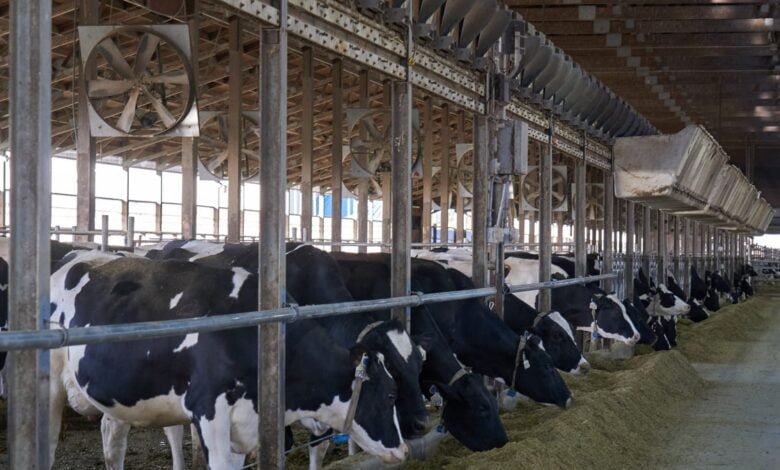Seventh dairy is hit with bird flu, the Iowa ag department says

Another dairy herd infected with highly pathogenic avian influenza has been reported in Sioux County, making it the fifth such outbreak in the northwest Iowa county.
The Iowa Department of Agriculture said Monday that bird flu, known as H5N1, was reported in a Sioux County herd with 10,000 cows. It’s the seventh outbreak in a dairy herd in Iowa since the first case was reported earlier in June.
The virus is deadly to chickens, turkeys and other poultry, and flocks where it is detected are destroyed to contain the virus. So far, however, the effects on dairy cows have been limited to symptoms like reduced appetite and milk production, and they are able to recover with supportive care.
Here’s what to know about the H5N1, which has plagued Iowa and the nation’s poultry industry since 2022 and began showing up in dairy herds in March.
Where have H5N1 outbreaks occurred in Iowa dairy herds, in addition to Sioux County?
The state’s first H5N1 case on a dairy farm was reported June 5 in a 4,500-cow herd in O’Brien County, followed by a June 7 outbreak a 250-cow herd in Sioux County.
The Iowa agriculture department reported another in Sioux County on Wednesday in a 1,700-cow herd, followed Friday by one in a 1,000-cow herd there. Also Friday, an outbreak showed up in a 3,000-cow herd in Plymouth County.
The fourth Sioux County detection came Saturday, in a 520-cow herd. Sioux, O’Brien and Plymouth counties share borders in dairy-heavy far northwest Iowa.
How many states and dairy herds have been infected with H5N1?
About 100 herds in 12 states have experienced outbreaks since March, when the virus spread from birds to cattle. The first detection in a dairy herd, confirmed with the help of the Iowa State University Veterinary Diagnostic Laboratory, was in Texas.
Can people get bird flu?
Yes, but the U.S. Centers for Disease Control and Prevention say the risk is low. Three U.S. dairy workers who were in contact with infected cows have been diagnosed with mild cases of bird flu. Mexico recently reported that the first human bird flu death in the current wave of infections occurred there April 24, according to the World Health Organization.
Is the U.S. food supply safe?
Federal officials say only milk from healthy animals is allowed in the food chain. Most U.S. milk is pasteurized to kill harmful bacteria and viruses, and dairy products in any food sold in interstate commerce must be receive the treatment. Some states, including Iowa, allow the sale of unpasteurized milk, but only via direct sales from small farms. The federal government has warned consumers against it use.
Have Iowa poultry flocks been hit with highly pathogenic avian influenza?
Iowa has had two outbreaks so far this year. Since 2022, the virus has hit 53 commercial and backyard flocks in the state, resulting in the deaths of about 23.3 million birds. Iowa is the nation’s largest egg producer and seventh-largest turkey producer.
How is the virus spread?
It is believed to be carried by migrating wild birds, which have infected domestic flocks.
The U.S. Department of Agriculture said last week the spread of H5N1 among dairy cows is believed to be linked to the movement of cattle between states, although wild birds haven’t been ruled out as carriers. The agency also suggests that farms where infections have been detected may have shared equipment, workers or service personnel.
Can livestock and poultry be vaccinated against bird flu?
Yes, but there are a number of technical problems associated with vaccination. Because the vaccine can mask symptoms in infected birds, other countries would likely ban U.S. poultry imports, costing producers an estimated $24 billion and axing 215,000 poultry jobs, an analysis shows. In addition, vaccinating hundreds of millions of chickens, turkeys and other poultry — potentially more than once — is a costly and practical challenge. Plus, researchers still are trying to determine how effective vaccines would be.
Donnelle Eller covers agriculture, the environment and energy for the Register. Reach her at deller@registermedia.com or 515-284-8457.
Source link




